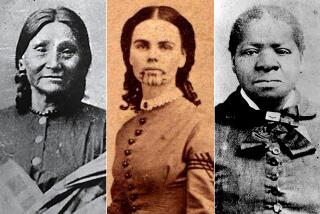A Mother and Son’s Footloose Odyssey
- Share via
A 9-year-old boy and his mother are driving all over the South and the Midwest. It is the 1950s. It’s not clear where they are headed or why they are moving from place to place in so random a fashion, but it is clear that mother and son enjoy a comfortable, solid relationship. Mom never seems to lose patience or snap at the lad, and young Roy, for his part, doesn’t pester his mom with unreasonable demands. They talk about everything, from what would happen if the sun went out to whether birds have souls:
“We travel a lot, don’t we, Mom?”
“Yes, we do, but except for Cuba and Mexico, only in the United States.”
“I like to draw maps.”
“You mean to copy them from the atlas?”
“Sometimes, just to learn where places are. But also I like to make countries up. . . . It’s fun to invent a world nobody else knows.”
“What’s your favorite country that you made up?”
“Turbania. It’s full of tribes of warriors. . . . Each tribe has its own language, though the Bazinis speak Spanish and maybe English, too, because of the shipping trade. The Forestanis can also speak like birds.”
Almost all of “Wyoming,” Barry Gifford’s latest novel, is made up of this engaging dialogue between parent and child. Wyoming itself is a place where they never go, but from what he’s heard of its wide-open spaces, it strikes young Roy as ideal. Someday, Mom agrees, they can go there and Roy can have a dog. “From now on when anything bad happens,” the boy resolves, “I’m going to think about Wyoming. Running with my dog.” Replies Mom: “It’s a good thing, baby. Everybody needs Wyoming.” A little later, Roy reaches the Proustian conclusion that sometimes it’s better to imagine how someplace is than to actually be there. Driving around in the car, he notes, can be more fun and less disappointing than arriving at one’s destination. Mom is proud of how wise he’s becoming.
Where, we may wonder, is Mom going, and why does she drive from place to place for no apparent reason? Roy, of course, is still too young to be puzzled: He uncritically assumes that whatever one’s mother does must be the right and necessary thing to do. Gradually, we get a few hints: Mom and Dad are no longer together, but whether Mom is hiding out from Dad or merely going from town to town to look up her old boyfriends is deliberately left up in the air. Ever conscientious, Mom speaks kindly of Dad to his son, but doesn’t rush to Dad’s side when she hears he’s unwell. We also learn that some of Dad’s old associates are not exactly on the up and up. “Buddy was a ballplayer,” recalls Roy of one of them. “Your dad told me Buddy could have had a career in the game, but he had a problem, so he didn’t go on.” “What kind of problem?” “He’s a fixer, Roy.” Mom later explains: “Your dad is a decent person, don’t get me wrong, but he does things you’ll never do. Your life will be different, Roy.”
*
There’s considerable appeal in Gifford’s laconic style and deadpan humor, which here is based on presenting shady characters and seedy circumstances in the simple, innocent language of a child talking with his mother. Unlike much of Gifford’s previous fiction (“Port Tropique,” “Wild at Heart,” “The Sinaloa Story”), in which a similar sort of matter-of-fact humor is used to present scenes of gruesome violence, “Wyoming” merits a “G” rating, which may constitute a breakthrough of sorts for the man who collaborated with David Lynch on the screenplay of “Lost Highway.” Certainly, in this latest book--charmingly illustrated with the author’s own pen-and-ink drawings--Gifford has succeeded in distilling the essence of childhood, evoking not only his young hero’s innocence and trustingness, but also his resilient cheerfulness and active imagination.
More to Read
Sign up for our Book Club newsletter
Get the latest news, events and more from the Los Angeles Times Book Club, and help us get L.A. reading and talking.
You may occasionally receive promotional content from the Los Angeles Times.









